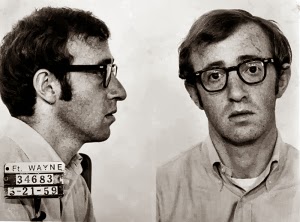
WHO WROTE IT - Allen Stewart Konigsberg was born in 1935. As a child, he sold jokes to newspapers under the name Woody Allen and legally changed his name to Heywood Allen at the age of 17. He wrote for the top television shows in the 1950s and performed stand-up comedy in the early 1960s, honing the nebbishy persona he would later bring to the big screen following his success as a Broadway playwright and director.
His zany comedies of the late 1960s and early 1970s were his most popular and made him a star. By the late 1970s, his films became more artistic and serious. On average, he puts out a movie a year, modestly budgeted with a cast of A-list actors who clamor to work with him, though the public pays attention to his films only once in a while.

In his early 40s, Allen is said to have been romantically involved with 17-year-old high school student Stacey Nelkin, a secret relationship he flaunted in his film Manhattan, in which he played a twice-divorced 42-year-old comedy writer dating a 17-year-old high school student (played by Mariel Hemingway).
A twelve-year relationship installed Mia Farrow as Allen’s next muse and produced a son whom the actress now claims may have been fathered by her first ex-husband, Frank Sinatra. She ended her personal and professional relationship with the 55-year-old director when she caught him having an affair with her 20-year-old adopted daughter from her second marriage and accused him of molesting their adopted 7-year-old daughter.
 |
| Woody Allen in Take the Money and Run (1969) |
BUT WHAT ABOUT BLUE JASMINE - Woody Allen’s 45th feature film shares elements of Tennessee Williams’ A Streetcar Named Desire about a Southern Belle who... Oh, come on. Who are we kidding? Ever since the filmmaker’s accuser, now 28, came out publicly last week with details of her two-decades-old abuse claims, no one gives a tweet about the actual movie anymore.
SO WILL IT WIN - Allen has been nominated in the Academy’s Best Original Screenplay category 16 times, more than any other screenwriter in history. He won three of those, plus a fourth in the directing heat for Annie Hall. He has six more nominations for directing, and one for Best Actor, also for Annie Hall, bringing his total nominations to 24.
Add to that his two Golden Globes, 9 BAFTAs, a Grammy, a HUGO, a Spirit, and five WGA awards, plus over a hundred more nominations, and it's clear that Allen’s oeuvre has always been awards-ceremony-friendly even if he has not. Allen is notorious for skipping his own fêtes, including last month’s Cecil B. DeMille award bestowed upon him by the Golden Globes for his five decades of work.
 |
| Oscar nominees Cate Blanchett and Sally Hawkins in Blue Jasmine |
Only Diane Keaton has won in a lead acting category for a Woody Allen film, so far. Blanchett is considered the front-runner, having already claimed the prize at the Globes and the SAG awards, as well as numerous critics’ contests. The director’s scandal is not expected to touch her, as long as she doesn’t do or say anything politically incorrect, like, say, signing on to work with Roman Polanski next.
Allen's Oscar record has had its biggest success in the supporting actress category, with 9 nominations and 4 wins. However, Hawkins was never a front-runner here, with most supporting actress kudos this year going to Lupita Nyong’o for 12 Years a Slave, so the scandal is definitely unlikely to impact her, either.
But what about Woody’s script? He, too, has been losing awards all season -- to Spike Jonze’s Her. But in the spirit of the old adage, “no publicity is bad publicity,” Hollywood could shift their votes into Allen’s column to show their support in the wake of the unproven allegations that have been dredged up after 22 years.
 |
| Roman Polanski and Woody Allen |
On the other hand, Allen's most recent win was just two years ago, his first since five years before his scandal broke. Midnight in Paris might have been his we-forgive-you award.
Might the Academy decide to show Allen how much they’re on his side with a fifth Oscar? Unlike the actual he-said-she-said allegations swirling around him, this is a question that will be definitively answered in less than 22 years.
This is Part 5 of our 10-part series of profiles on this year's Oscar-nominated screenplays.
No comments:
Post a Comment